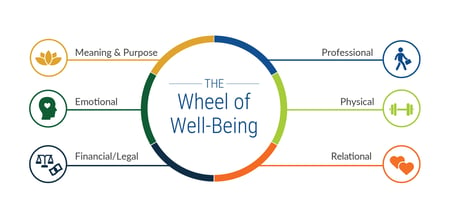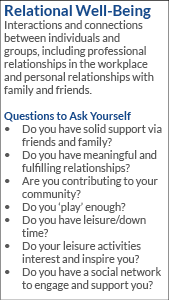 The VITAL WorkLife Wheel of Well-Being is a tool used to evaluate distinct areas of life and build overall well-being through improving each dimension of well-being. Your overall well-being is made of multiple dimensions. Relational Well-Being is one of the dimensions contributing to your holistic health; you cannot achieve overall well-being without having balance in each of the dimensions.
The VITAL WorkLife Wheel of Well-Being is a tool used to evaluate distinct areas of life and build overall well-being through improving each dimension of well-being. Your overall well-being is made of multiple dimensions. Relational Well-Being is one of the dimensions contributing to your holistic health; you cannot achieve overall well-being without having balance in each of the dimensions.
Relational Well-Being
At VITAL WorkLife, we define Relational Well-Being as:
"Valuing the importance of human connection while creating, engaging, and maintaining meaningful and authentic relationships with self, individuals, groups and our communities."
But How Can You Achieve and Maintain Relational Well-Being?
Everyday Relational Well-Being involves:
- Reflecting on yourself and your social and relational needs. What aspects of your social life do you enjoy? What parts would you like to improve?
- Make an effort to keep in touch with supportive friends and family, even if a brief call or text message.
- Be conscious of your investment in “giving back, even in small ways.
- Practice active listening when you are interacting with friends, family, and colleagues.
- Join a club or organization.
 What Contributes to Relational Well-Being?
What Contributes to Relational Well-Being?
Many factors contribute to Relational Well-Being, including volunteering, building your self-awareness, making time for fun and leisure. There are many areas available to you to work on, if you are interested in improving your Relational Well-Being. Even though you may have limited control in some areas, other areas are well within your control.
Many studies, have documented how poor social health results in sickness or disease. A social issue like isolation or loneliness caused by a poor support network doubles risk of death within any time period, at any age – a risk greater than smoking!
On the other hand, good Relational Well-Being leads to improvement in all areas of your life. When you make the choice to improve your social health, you will perform better under stress, boost your self-esteem, increase your energy levels and achieve better overall physical health.
Case Study
Sharon worked long hours and was deeply committed to her team and her co-workers, often taking work home and coming in on weekends to finish up projects or get a head-start on the next big idea. While she was successful at work, she started to feel disconnected from her family and was missing out on birthday celebrations and milestones of the important people in her life.
Sharon recognized she was not the only one feeling this strain, as her children and spouse were noticing and commenting on her absence as well. Sharon decided she was out of balance; while she felt successful and fulfilled at work, she was starting to feel resentful of the time away from the people she cared about.
In addition she was totally cut off from her community and missed the volunteering she used to do on a regular basis. In order to find some balance, Sharon made the conscious choice to not bring work home on a Friday night and use the time instead to plan a Saturday outing with her family. They decided it would be great to volunteer together at their local food-shelf, to connect with each other and support their community. On Sunday, when Sharon reflected on the smiles on her children’s faces and the contentment she felt after re-connecting with her family and community, she made a point to re-focus on her Relational Well-Being and make it an important part of her everyday life once again.
How to Achieve and Maintain Relational Well-Being
Relational Well-Being works a lot like physical fitness. It pays off immediately and in the long run. Similarly, though generally enjoyable and rewarding, it does not come without discipline and effort. A lack of physical fitness can send you to the doctor. Yet you don’t go to the doctor to get fit, you go to the local gym or start a personal fitness program. Like physical fitness, improvements in Relational Well-Being require changes to your lifestyle. Start by assessing your Relational Well-Being and identify small changes you can make to enhance your connections to others and to your community.
To learn more about your Relational Well-Being dimension, you can read from our recommended reading list.
We Can Help
VITAL WorkLife supports all dimensions of your Wheel of Well-Being. Call us anytime, day or night, for support of your Relational Well-Being.
- EAP members call 800.383.1908 or access resources through your VITAL WorkLife App
- Physician Well-Being Resources members call 877.731.3949 or access resources through your VITAL WorkLife App
Check out our video below to learn more about the Wheel of Well-Being:
Source:
Social Wellness: Definition of Social Wellness, University of California, Davis, Student Health and Counseling Services, https://shcs.ucdavis.edu/wellness/social/#.VwwWH7n2aJI


